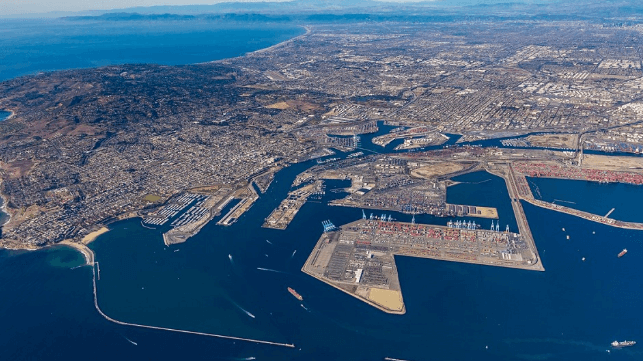Longshore Workers Continue to Disrupt West Coast Port Operations

Terminals at U.S. West Coast ports are continuing to experience “no shows” and a shortage of staff with uncertainty over the current dispute between the Pacific Maritime Association and the International Longshore and Warehouse Workers union. CNBC is reporting that some terminals are advising truckers and shippers that they will be closed again on Monday, while the union and port officials continue to say operations are continuing.
CNBC reports it obtained a copy of an email sent by Total Terminal International advising truckers that it was canceling appointments for both ships at its terminals in Long Beach and Seattle. In addition, CNBC is reporting that union members have continued not to show up for work at the Port of Oakland since Friday morning.
It will be the fourth day of disruptions in the operations since ILWU members began not showing up for work. No one is officially saying they are on strike, but reports are indicating that the daily workers are not reporting to fill in as needed at the terminals leaving the terminals to operate short staff or opting to close.
The Port of Long Beach issued a statement on behalf of its Executive Director, Mario Cordero, addressing the current situation and the labor contract negotiations. “All container terminals at the Port of Long Beach remain open,” says the statement dated June 2. “As we monitor terminal activity, we urge the PMA and ILWU to continue negotiating in good faith toward a fair agreement.”
There have been no further public statements from either the union or the association representing the employers since they traded public remarks on Friday. The PMA said the union was “staging concerted and disruptive work actions,” impacting terminals ranging from the ports of Los Angeles, Long Beach, and Hueneme in southern California as well as moving north along the coast at Oakland, Tacoma, and Seattle.
The ILWU Local 13, which covers the Southern California ports, said in its statement, “cargo operations in the ports continue as longshore workers remain on the job,” while saying it was fighting for respect from the foreign-owned ocean carriers and terminal operators.
Union headquarters in its statement refuted claims that the contract negotiations had broken down. They said “We are getting there,” while saying “We aren’t going to settle for an economic package that doesn’t recognize the heroic efforts and personal sacrifices of the ILWU workforce that lifted the shipping industry to record profits.”

that matters most
Get the latest maritime news delivered to your inbox daily.
The Marine Exchange which oversees the movement of vessels in and out of the Southern California ports commented late on Friday that it was “a confusing day.” Captain Kip Louttit in his update said “Vessel traffic is still moving per schedules and no schedules have slipped,” while citing the media reports of terminals closing in the ports as well as at Hueneme and Oakland.
Louttit highlights that 72 vessels have registered with the management system as either being en route to the ports of Los Angeles, Long Beach, or Oakland, or as of June 1 scheduled to begin their voyage within 24 hours. The number of vessels bound for the southern California ports is 61, 10 more than the prior week, with the Marine Exchange saying it would revert to its voluntary queuing system if a backlog begins to build. Vessels would be asked to remain at least 20 miles from the coast “until they are reasonably certain they have a berthing assignment within three days.” If there is a labor shortage, the Marine Exchange is saying labor would be assigned based on the vessel's calculated date/time of arrival on the Master Queuing List for the ports, allocating labor as was done during the 2021-2022 backup.
